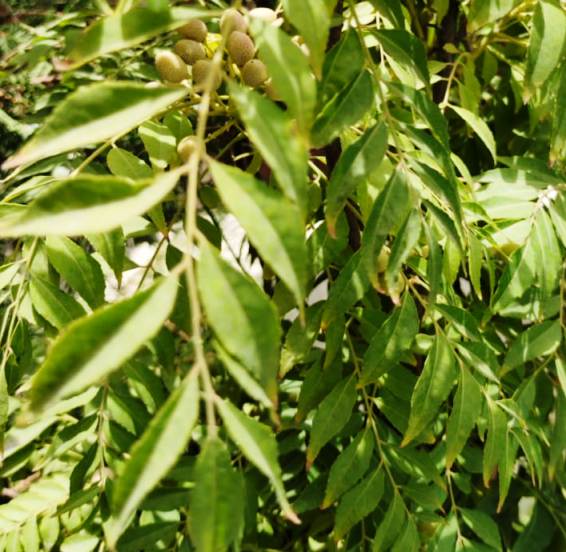करी पत्ते के पौधे के स्वास्थ्य लाभ (मुरैया कोएनिगी लिन. स्प्रेंगल)
The word curry comes from the Tamil word 'kari,' which means spiced sauces. Curry leaves (Murraya koenigii), also known as sweet neem leaves, are widely utilised in Indian cuisine and medicine. They're little green leaves with a distinct aroma and flavour.
They're commonly used to season South Indian meals like sambhar, rasam, and chutney. Curry leaf (Murraya koenigii Spreng.) is a perennial leaf vegetable that grows on an aromatic deciduous tree.
Although it is classified as a minor spice, its flavor-enhancing abilities complement eastern cooking, and the leaves retain their flavour and perfume long after drying; as a result, it is frequently employed in both culinary and Ayurvedic medicine.
It is one of the richest sources of carbozole alkaloids, in addition to the extensive chemical ingredients responsible for the plant's medicinal properties. M. koenigii extracts caused a spike in blood sugar levels and were very toxic to major pathogens.
Curry leaves don't have the same flavor as the curry we're used to. They have a garlic flavour comparable to asafoetida, but are more herbal, like basil or kafir lime leaves. They have a lemony fragrance to them.

Nutritional Value of Curry Leaves
Curry leaves contain roughly 108 calories per 100 grams. Carbohydrates, proteins, fibre, calcium, phosphorus, iron, and other minerals abound in them. Vitamins such as vitamin A, vitamin B, vitamin C, and vitamin E are also present.
Health Benefits of Curry Leaves
Powerful antioxidant
Curry leaves contain a high concentration of plant chemicals that are effective antioxidants. These molecules keep us healthy and defend us against a variety of ailments. They protect us from oxidative damage, which can lead to disorders of the neurological system, cardiovascular system, and kidneys, among other things.
May reduce the risk of cancer
Curry leaves contain antimicrobial properties. They defend our body against a variety of malignancies. Curry leaves contain flavonoids, which are anti-cancer agents. They are effective at stopping breast cancer cells from growing. Curry leaves also help to prevent colon cancer. Curry leaves can also help to prevent cervical cancer in our bodies.
Reduces risk of heart diseases
Curry leaves help to keep our hearts healthy by avoiding oxidative stress. Curry leaves can also help to lower cholesterol levels. It also helps to lower triglyceride levels. As a result, lowering risk factors helps to protect us from heart disease.
Helps in the management of diabetes
Curry leaf consumption aids in the treatment of diabetes and its consequences. Curry leaves have been shown to be quite beneficial in lowering blood glucose levels. Curry leaves are high in fibre, which slows digestion and prevents blood sugar levels from rising too quickly. They also aid people with diabetes by increasing insulin action. Other items that can be included in your Diabetic Diet Plan can be found on the Diabetes Food Chart.
Helps to prevent morning sickness
The intake of curry leaf tea can successfully decrease morning sickness and nausea. Curry leaf tea is extremely helpful for pregnant ladies who are experiencing morning sickness.
Pain reliever
Curry leaves have traditionally been used as an analgesic and have been found to be effective in alleviating pain (pain reliever).
Neuroprotective properties
Curry leaves have been shown to increase antioxidants that protect our brain. They've also been found to help with Alzheimer's disease by preventing oxidative damage to the neurons. Curry leaves have also been proven to help with amnesia (memory loss), which is frequent among the elderly.
Excellent for our hair
Curry leaves cooked in coconut oil produce a great hair tonic that prevents greying and promotes hair growth. They help to keep our hair healthy and prevent hair loss. They also aid in the prevention of dandruff and dry scalp.
Treatment of Anaemia
Curry leaves are high in iron and folic acid, both of which help the body's iron levels. This is extremely beneficial to anaemia patients
Helps in weight loss
Curry leaves contain alkaloids that help to keep cholesterol levels in our bodies in check. Curry leaves are also a detoxifying agent, meaning they remove toxins from our bodies and prevent fat storage. This contributes to weight loss.
Conclusion
Curry leaves (Murraya koenigii) are a type of leafy vegetable in the Rutaceae family. The plant's pharmacological actions include cardiovascular activity, anti-diabetic and cholesterol-lowering properties, antibacterial activity, antiulcer activity, antioxidative activity, cytotoxic activity, anti-diarrhea activity, and phagocytic activity.
The volatile oil makes up the chemical composition of Murrayakoenigii's new leaves.
Murraya koenigii stem bark and roots have been used to isolate carbazole alkaloids and triterpene. As a result, more phytochemical, pharmacological, and clinical research on curry leaves is needed to establish a viable natural medicine that can provide therapeutically effective lead compounds.
References
- Singh Suman, Omre P.K. ,And Mohan Madan Sandhya :2014,” Curry Leaves (Murraya Koenigii Linn. Sprengal)- A Mircale Plant” Indian J.Sci.Res.4 (1): 46-52.
- Arulselvan P. and Subramanian S.P. ; 2007. "Beneficial effects of Murraya koenigii leaves on antioxidant defense system and ultra structural changes of pancreatic betacells in experimental diabetes in rats". Chem Biol Interact., 16(2): 155–64.
- Arulselvan P., Senthilkumar G.P., Sathish Kumar D. And Subramanian S.; 2006. "Antidiabetic effect of Murrayakoenigii leaves on streptozotocin induced diabetic rats", Pharmazie , 61 (10): 874–877.
Authors:
Poonam1 , Rahul Singh Sikarwar2, Rahul SinghTomar3
1Ph.D. Scholar, Department of Horticulture, Rajmata Vijayaraje Scindia Krishi Vishwa Vidyalaya, Gwalior (M.P.)-474002, India
2P.G. Student, Department of Extension Education, R.A.K. College of Agriculture Sehore, R.V.S.K.V.V. Gwalior, (M.P.) India
3P.G. Student, Department of Extension Education, College of Agriculture Gwalior, R.V.S.K.V.V. Gwalior, (M. P.) India
Corresponding-Email:
